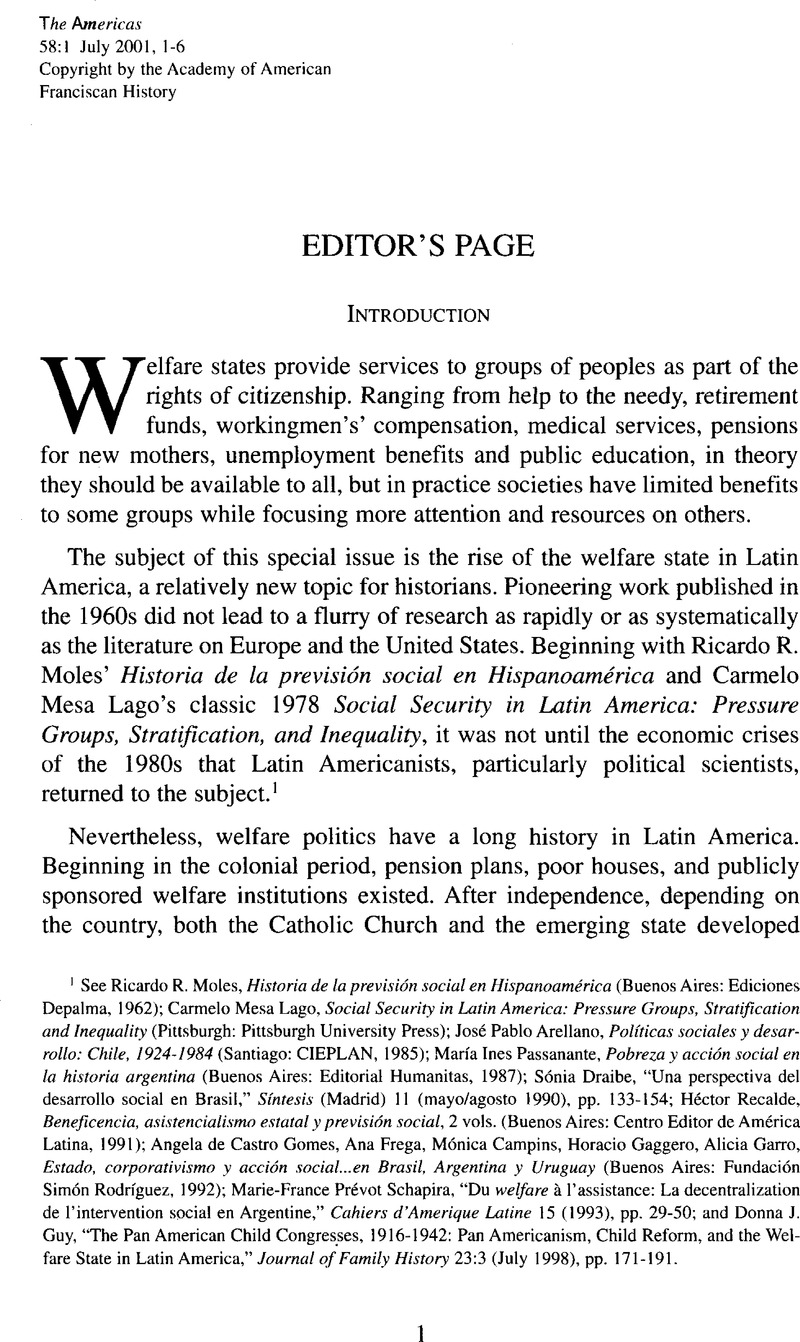Article contents
Introduction
Published online by Cambridge University Press: 11 December 2015
Abstract

- Type
- Editor's Page
- Information
- Copyright
- Copyright © Academy of American Franciscan History 2001
References
1 See Moles, Ricardo R., Historia de la previsión social en Hispanoamérica (Buenos Aires: Ediciones Depalma, 1962);Google Scholar Lago, Carmelo Mesa, Social Security in Latin America: Pressure Groups, Stratification and Inequality (Pittsburgh: Pittsburgh University Press);Google Scholar Arellano, José Pablo, Políticas sociales y desarrollo: Chile, 1924–1984 (Santiago: CIEPLAN, 1985);Google Scholar Passanante, María Ines, Pobreza y acción social en la historia argentina (Buenos Aires: Editorial Humanitas, 1987);Google Scholar Draibe, Sónia, “Una perspectiva del desarrollo social en Brasil,” Síntesis (Madrid) 11 (mayo/agosto 1990), pp. 133–154 Google Scholar; Recalde, Héctor, Beneficencia, asistencialismo estatal y previsión social, 2 vols. (Buenos Aires: Centro Editor de América Latina, 1991);Google Scholar de Castro Gomes, Angela, Frega, Ana, Campins, Mónica, Gaggero, Horacio, Garro, Alicia, Estado, corporativismo y acción social … en Brasil, Argentina y Uruguay (Buenos Aires: Fundación Simón Rodríguez, 1992);Google Scholar Prévot Schapira, Marie-France, “Du welfare à l'assistance: La decentralization de l'intervention social en Argentine,” Cahiers d'Amerique Latine 15 (1993), pp. 29–50 Google Scholar; and Guy, Donna J., “The Pan American Child Congresses, 1916–1942: Pan Americanism, Child Reform, and the Welfare State in Latin America,” Journal of Family History 23:3 (July 1998), pp. 171–191.CrossRefGoogle Scholar
2 Chandler, Dewitt Samuel, Social Assistance and Bureaucratic Politics: The Montepíos of Colonial Mexico, 1767–1821 (Albuquerque: University of New Mexico Press, 1991);Google Scholar Sociedad de Beneficencia de la Capital (Argentina), Sociedad de Beneficencia de la Capital, 1823–1936 (J. Peuser, Ltda., 1936); Russell-Wood, J.R., Fidalgos and Philanthropists; the Santa Casa de Misericórdia of Bahia, 1550–1755 (Berkeley: University of California Press, 1968). There are several unpublished doctoral dissertations dealing with this topic in the national period.Google Scholar
3 Examples of this genre include Koven, Seth and Michel, Sonya, eds., Mothers of a New World; Maternalist Politics and the Origins of Welfare States (New York and London: Routledge, 1993);Google Scholar Gordon, Linda, ed., Women, the State, and Welfare (Madison: University of Wisconsin Press, 1990);Google Scholar Bock, Gisela and Thane, Pat, eds., Maternity & Gender Policies; Women and the Rise of the European Welfare States 1880s–1950s (New York and London: Routledge, 1991);Google Scholar Skocpol, Theda, Protecting Soldiers and Mothers; The Political Origins of Social Policy in the United States (Harvard: Belknap Harvard, 1993)Google Scholar; Moeller, Robert G., Protecting Motherhood; Women and the Family in the Politics of Postwar West Germany (Berkeley: University of California Press, 1993)Google Scholar; and Sainsbury, Diane, Gender, Equality and/Welfare States (London: Cambridge University Press, 1996)CrossRefGoogle Scholar; and Michel, Sonya, Children's Interests/Mothers’ Rights; The Shaping of America's Child Care Policy (New Haven: Yale University Press, 1999).Google Scholar
4 Macías, Anna, Against All Odds: The Feminist Movement in Mexico to 1940 (Westport, Conn.: Greenwood Press, 1982)Google Scholar; Femenía, Nora Amalia, “Argentina's Mothers of the Plaza de Mayo: The Mourning Process, From Junta to Democracy,” Feminist Studies 13:1 (Spring 1987), pp. 9–18 CrossRefGoogle Scholar; Miller, Francesca, “Latin American Feminism and the Transnational Arena, “in Seminar on Feminism and Culture in Latin America, Women, Culture, and Politics in Latin America (Berkeley: University of California Press, 1990), pp. 182–264 Google Scholar; Hahner, June, Emancipating the Female Sex: The Struggle for Women's Rights in Brazil, 1850–1940 (Durham: Duke University Press, 1990)Google Scholar; Stoner, K. Lynn, From the House to the Streets: The Cuban Women's Movement for Legal Reform, 1898–1940 (Durham: Duke University Press, 1991)CrossRefGoogle Scholar; Jaquette, Jane S., ed., The Women's Movement in Latin America: Participation and Democracy (Boulder: Westview Press, 1994)Google Scholar; Lycklama à Nijeholt, Geertje, Vargas, Virginia, and Wieringa, Saskia, eds., Women's Movements and Public Policy in Europe, Latin America, and the Caribbean (New York: Garland, 1998)Google Scholar; Lavrin, Asunción, Women, Feminism, and Social Change in Argentina, Chile, and Uruguay, 1890–1940 (Lincoln: University of Nebraska Press, 1995);Google Scholar Guy, Donna J., White Slavery and Mothers Alive and Dead; The Troubled Meeting of Sex, Gender, Public Health, and Progress in Latin America (Lincoln: University of Nebraska Press, 2000).Google Scholar
5 See Ann Blum, this issue, p. 10.
6 An analysis of various welfare state typologies can be found in Alonso, Guillermo V., Política y seguridad social en la Argentina de los ’90 (Buenos Aires y Madrid: FLACSO, 2000), pp. 34–44.Google Scholar
7 Guy, Donna J., “La ‘verdadera’ historia de la Sociedad de Beneficencia,” in Moreno, José Luis, comp., La política social antes de la política social: Caridad, beneficencia y política social en Buenos Aires, siglos XVII a XX (Buenos Aires: Trama editorial/Promoteo Libros, 2000), pp. 321–341.Google Scholar
8 Sandra McGee Deutsch has analyzed the role of women in right wing movements in Argentina, Brazil and Chile. Some of these women were associated with Catholic groups. Sandra McGee Deutsch, “The Catholic Church, Work, and Womanhood in Argentina, 1890–1930,” in Yeager, Gertrude M., ed., Confronting Change, Challenging Tradition: Women in Latin American History (Wilmington, Del.: Scholarly Resources, Inc., 1994), pp. 127–151;Google Scholar Las Derechas: The Extreme Right in Argentina, Brazil, and Chile, 1890–1939 (Stanford: Stanford University Press, 1999).
- 2
- Cited by


